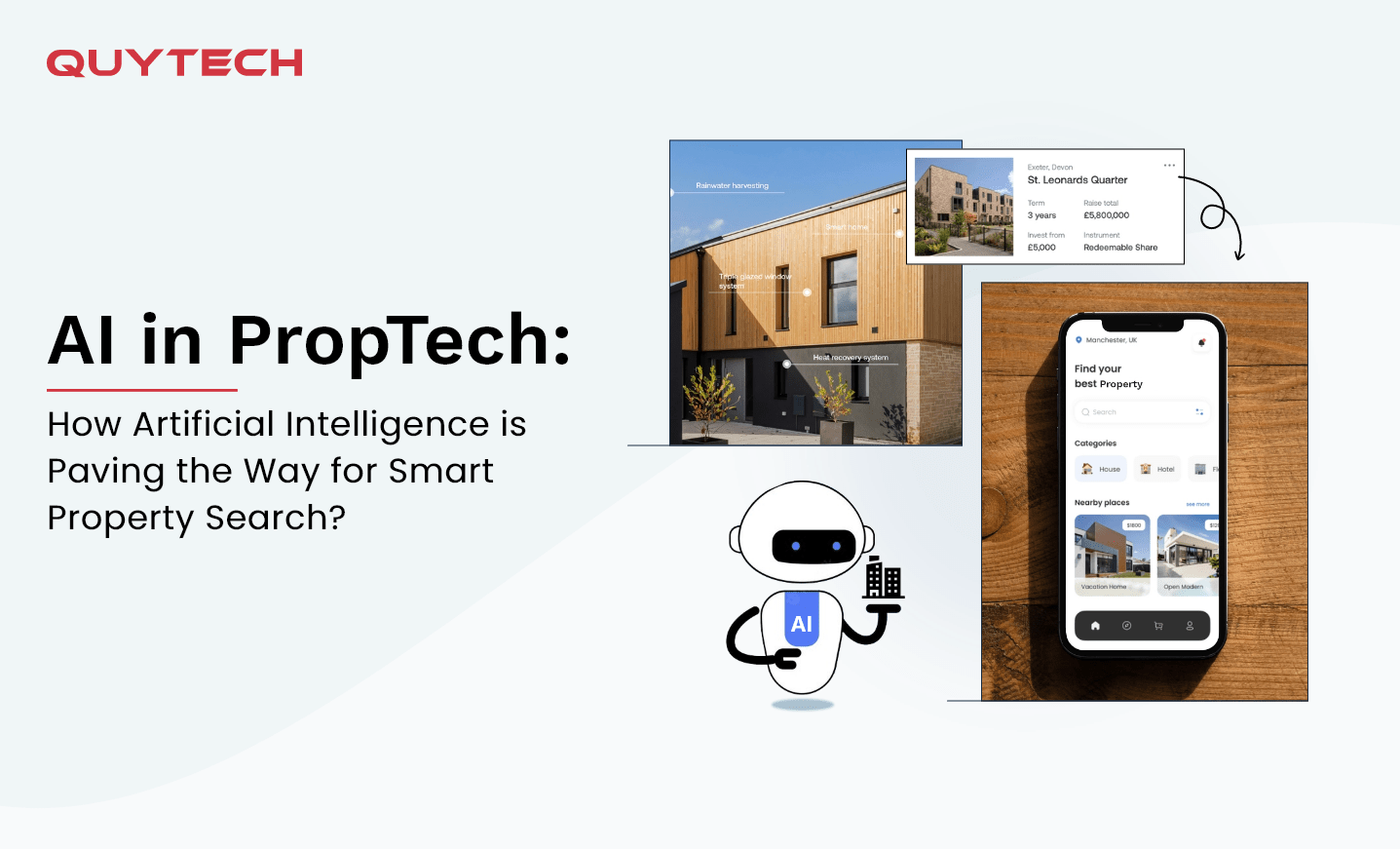In the dynamic and ever-evolving world of technology, Artificial Intelligence (AI) has emerged as a game-changer across various sectors, and real estate is no exception. From property management, space management, architecture, and real estate investments to smart home automation and automated virtual dealers, AI or artificial intelligence solutions are redefining the way we interact with real estate. To understand the pace at which AI is getting into the world of proptech, let’s glance through these statistics.
According to Statista, 2021 witnessed the highest value of proptech investment, amounting to 24 billion U.S. dollars, and this number is increasing at an unprecedented rate.
Another report by Future Market Insights highlights that the proptech market is projected to grow at a CAGR of 16.8% during 2022-2032 to reach USD 86.5 billion.
The tech-savvy millennial generation accounts for nearly 43% of the housing market, leading to an increase in the demand for smart homes with IoT-enabled devices.
Let’s delve deeper into the fascinating realm of AI in proptech and explore the groundbreaking applications that are reshaping the industry. But before that, let’s start with the definition of proptech.
What is Proptech?
Proptech, a combination of “property” and “technology,” represents the dynamic fusion of cutting-edge technological innovations with the traditional real estate sector. It encompasses an array of transformative digital tools, applications, and platforms that revolutionize the way properties are developed, managed, transacted, and experienced.
At its core, proptech harnesses the power of emerging technologies, including artificial intelligence, augmented reality, machine learning, Internet of Things, and blockchain, to reshape and optimize the real estate landscape. By leveraging these hi-tech advancements, proptech aims to enhance efficiency, transparency, and sustainability while delivering unparalleled value and seamless experiences to stakeholders involved in the real estate ecosystem.
16 Innovative Use Cases of AI in Proptech
1. Enhancing Property Search and Recommendation Systems

Finding the perfect property has always been a challenging task, but AI has revolutionized the way we search for real estate. Advanced machine learning algorithms are employed to analyze vast amounts of data, including property listings, user preferences, and market trends.
By unlocking the potential of natural language processing and image recognition, AI-powered platforms can accurately understand user requirements and deliver personalized property recommendations. This level of precision saves time, increases customer satisfaction, and boosts overall efficiency in the real estate market.
2. Personalized Interior Design
AI-powered platforms can analyze user preferences, design styles, and existing furniture to provide personalized interior design recommendations. By leveraging computer vision and machine learning, AI-enabled systems can suggest furniture arrangements, color palettes, and decor options that align with the user’s taste, creating a truly customized living space. It can prevent homeowners from shelling out money on expensive interior designers.
3. Virtual Assistants and Customer Service

AI-powered virtual assistants, or chatbots, are transforming customer service in the proptech industry. These intelligent bots leverage natural language processing and sentiment analysis to understand user queries and provide relevant information promptly. Whether it’s answering property-related questions, scheduling property tours, or facilitating rental agreements, virtual assistants can handle a wide range of tasks efficiently, saving time for both customers and agents.
Furthermore, with the advent of voice recognition and natural language understanding, virtual assistants can even communicate and engage in conversations, mimicking human interactions to a remarkable extent. As per a study by Juniper Research, chatbots powered by AI are projected to save businesses over $8 billion annually by 2022
4. Predictive Analytics and Investment Decisions

Investing in real estate requires careful analysis of various factors such as market trends, property value, and potential return on investment. AI-based predictive analytics models leverage historical data to forecast future trends, helping investors make informed decisions.
These models analyze market indicators, economic data, and even social media sentiment to provide invaluable insights for property investment. Armed with these predictive capabilities, investors can optimize their portfolios, mitigate risks, and capitalize on emerging opportunities. A survey conducted by Deloitte found that 81% of real estate companies believe that predictive analytics will have a high impact on their businesses in the next two years.
5. Smart Property Management and Automation

AI-driven technologies have given rise to intelligent property management systems that streamline operations, enhance security, and improve overall efficiency. Machine learning algorithms analyze data from various sources, including IoT devices, sensors, and occupancy patterns, to optimize resource allocation, energy consumption, and maintenance schedules.
Smart home automation powered by AI enables residents to control their homes remotely, manage energy consumption, and enjoy personalized experiences through voice commands or mobile apps. These advancements not only enhance the quality of living but also contribute to sustainable practices and cost savings. A report by MarketsandMarkets estimates that the global smart building market size is projected to grow at a fast pace to reach $108.9 billion by 2025, with AI being a key driver in optimizing building operations and energy efficiency.
6. Automated Property Valuation
AI-powered algorithms can analyze historical sales data, property characteristics, and market trends to accurately estimate property values. The technology allows real-estate owners or investors to provide inputs or specific parameters to evaluate different properties in no time. This enables real estate professionals and homeowners to make informed pricing decisions, saving time and ensuring fair market value.
7. Tenant Screening and Fraud Detection
AI algorithms can analyze tenant applications, credit histories, and public records to assess the credibility and risk associated with potential tenants. This helps property owners and managers identify trustworthy tenants and minimize the chances of rental fraud and various other potential issues. They can identify patterns and different risk factors before selecting tenants for their property.
8. Energy Efficiency Optimization
Advanced AI solutions can monitor and analyze energy consumption patterns in buildings, identify energy-saving opportunities, and suggest optimizations. By intelligently managing heating, cooling, and lighting systems, artificial intelligent-based solutions can significantly reduce energy costs and contribute to sustainable practices in proptech. To make this possible, artificial intelligence-powered systems take real-time data from IoT sensors, smart meters, and other advanced building management systems.

9. Property Maintenance and Predictive Maintenance
Artificial intelligence can facilitate proactive property maintenance by analyzing sensor data, historical maintenance records, and weather patterns to predict maintenance needs. This enables property managers to schedule maintenance tasks efficiently, reducing downtime, and improving tenant satisfaction. AI, in combination with machine learning, can detect anomalies and also optimize maintenance schedules.
10. Risk Assessment and Insurance Underwriting
AI-based algorithms can analyze property data, historical claims, and external factors to assess risks associated with insuring specific properties, investment returns, and market conditions. Insurance companies can leverage this technology to make more accurate underwriting decisions, streamline the claims process, and provide custom-made coverage options.
11. Market Demand Analysis
AI-powered analytics platforms can analyze market trends, demographic data, and economic indicators to identify emerging real estate markets and investment opportunities. The technology can process enormous amounts of data in seconds to provide valuable insights that can help investors, developers, and real estate professionals to make data-backed decisions and stay ahead of market fluctuations.
12. Automated Document Processing

AI-powered software can streamline document processing tasks by automatically extracting relevant information from contracts, lease agreements, and legal documents. This not only saves time and reduces administrative burden but also minimizes the chances of costly human error. Moreover, AI-enabled document processing solutions can automate workflows, streamline approvals, and ensure transparent and seamless collaboration among stakeholders.
13. Smart Building Security

AI can enhance building security by leveraging facial recognition, anomaly detection, and behavior analysis. AI-powered security systems can quickly identify potential threats, unauthorized access, or suspicious activities, enabling timely intervention and ensuring the safety of occupants.
14. Sustainable Construction and Materials
Artificial intelligence can optimize the construction process by analyzing building designs, material properties, and environmental factors. By considering factors such as energy efficiency, carbon footprint, and sustainability ratings, AI algorithms can recommend the most environmentally friendly construction materials and techniques, contributing to greener and more sustainable buildings.
15. Intelligent Space Utilization
Advanced AI algorithms can analyze occupancy patterns, usage data, and employee preferences to optimize space utilization in commercial buildings. By identifying underutilized areas, predicting demand, and suggesting flexible workspace arrangements, this technology can help organizations optimize their office layouts, reduce costs, and create more collaborative environments.
16. Virtual Property Tours and Visualization

Artificial Intelligence (AI), combined with virtual reality (VR) or augmented reality (AR), can provide immersive property tours and visualizations. Prospective buyers or tenants can remotely explore properties in a realistic virtual environment, visualize renovations or interior designs, and make more informed decisions without the need for physical visits.
To turn these AI app development ideas or use cases into reality, you can hire mobile application developers with hands-on experience in developing AI-based proptech solutions. It would be great if they have a knack of other relevant technologies, such as machine learning, augmented reality, virtual reality, etc., which can make wonders when used together with AI.
To Sum Up
Artificial Intelligence is undeniably reshaping the proptech industry, revolutionizing property search, investment decisions, property management, and customer service. The advancements in AI are enabling unprecedented levels of personalization, efficiency, and convenience. As we venture further into the digital age, the synergy between AI and proptech will continue to drive innovation and create new possibilities in the real estate landscape.
Embracing AI in proptech is not just a matter of staying ahead; it is about unlocking the immense potential that technology holds to enhance every aspect of proptech. So, what are you waiting for? Reach out to a reliable and experienced AI app development company to get a new AI solution for proptech or revamp your existing real estate solution (website or application) with the capabilities of artificial intelligence.

